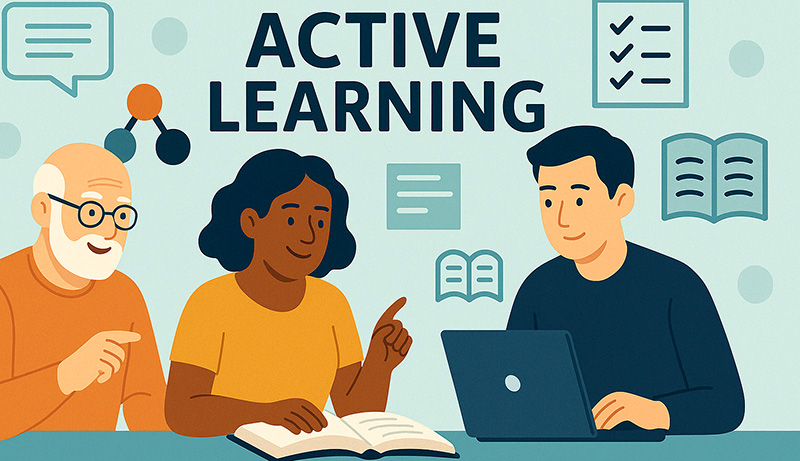
This training course is designed with a strong focus on Active learning, tailored specifically to the needs and principles of Adult Education.
About the Training Course
Active learning engages participants directly in the learning process through practical, learner-centred methods that encourage reflection, application, and collaboration. Rather than passively receiving information, adult learners are actively involved in exploring real-life topics and developing relevant skills.
A key component of the course is collaborative learning, especially during On-Site sessions. Through group discussions, peer-to-peer tasks, problem-solving activities, and role-plays, learners benefit from shared experiences, social interaction, and cooperative knowledge-building. This approach not only enhances understanding but also fosters motivation, self-efficacy, and community among participants.
By combining digital self-study with dynamic, interactive group work, the course provides a flexible and effective learning experience aligned with the principles of lifelong learning.
Learning Objectives
Upon completion of this course, participants will be able to:
- Comprehend the fundamental tenets underpinning Active Learning methodologies.
- Employ strategies efficacious in fostering student participation and the attainment of deeper learning outcomes.
- Integrate Active Learning techniques seamlessly within a Flipped Learning 3.0 approach.
- Develop lesson plans and associated activities that prioritise a learner-centred pedagogical approach.
Active Learning for Adult Educators: Blended Learning 3.0 Structure
This course utilizes a Blended Learning 3.0 approach, combining online modules with interactive group learning spaces to foster a profound understanding and practical application of active learning strategies in adult education.
Module 1: Foundations of Active Learning (Online - Estimated Time: 1 - 1.5 hours)
- Introduction to Active Learning: Defining active learning and its core principles.
- The Benefits of Active Learning for Adult Learners: Connecting active engagement to adult learning theories (e.g., Knowles’ Andragogy).
- Exploring the Active Learning Continuum: From simple engagement techniques to more complex collaborative activities.
- Self-Reflection: Participants consider their current teaching practices and identify potential areas for incorporating active learning.
Module 2: Designing Engaging Active Learning Activities (Online - Estimated Time: 1.5 - 2 hours)
- Categorizing Active Learning Strategies: Exploring various techniques (e.g., discussions, problem-solving, simulations, debates, think-pair-share).
- Aligning Activities with Learning Objectives: Ensuring active learning tasks directly support desired outcomes.
- Adapting Existing Content for Active Engagement: Strategies for transforming passive learning materials into active learning opportunities.
- Utilizing Digital Tools for Active Learning: Exploring online platforms and applications that support interactive activities.
Module 3: Facilitating Active Learning in Adult Education (Online - Estimated Time: 1 - 1.5 hours)
- Creating a Supportive and Inclusive Learning Environment: Strategies for fostering participation and engagement among diverse adult learners.
- Effective Questioning Techniques: Using questions to stimulate critical thinking and discussion.
- Managing Group Dynamics: Strategies for facilitating effective collaboration and addressing potential challenges.
- Providing Constructive Feedback during Active Learning: Guiding learners and reinforcing understanding.
Module 4: Assessment and Reflection in Active Learning (Online - Estimated Time: 1 - 1.5 hours)
- Assessing Learning Outcomes in Active Learning Environments: Exploring methods beyond traditional testing.
- Incorporating Self-Assessment and Peer Assessment: Empowering adult learners to take ownership of their learning.
- Reflecting on Active Learning Implementation: Encouraging participants to critically evaluate their experiences and identify areas for growth.
- Resources and Continued Learning: Providing access to further resources and opportunities for ongoing professional development.
Group Learning Space: Active Learning in Practice (Estimated Time: 3 - 4 hours)
- Welcome and Introduction: Setting the stage for the practical application of active learning.
- Case Study Analysis: Participants work in groups to analyze real-world case studies of active learning implementation in adult education.
- Activity Practice and Implementation: Guided practice sessions where participants design, implement, and receive feedback on various active learning activities.
- Peer Feedback and Reflection: Opportunities for participants to share their experiences and learn from each other.
- Action Planning: Participants begin to develop concrete plans for integrating active learning strategies into their own teaching contexts.

